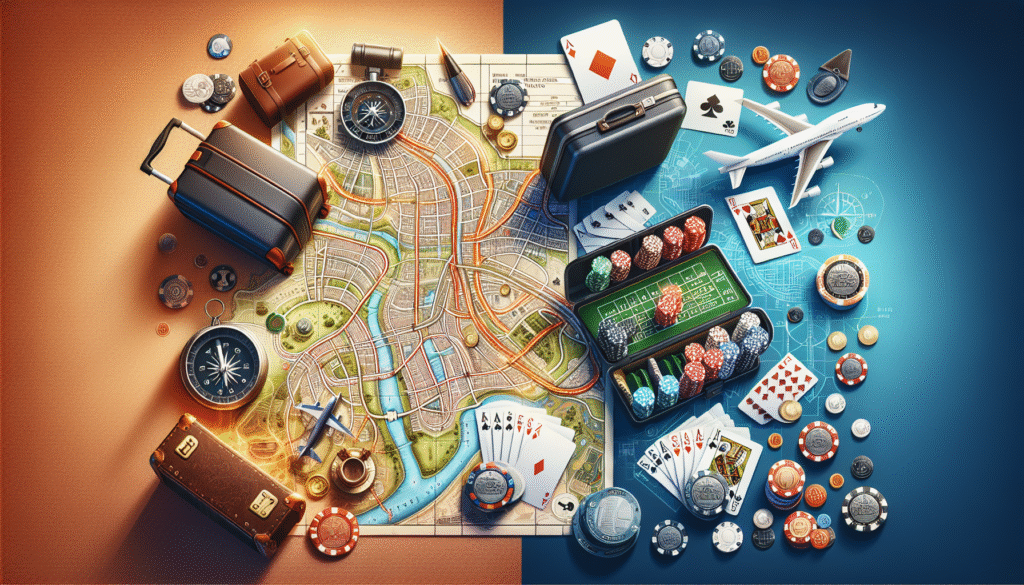
Smart Casino Travel: Mastering the Casino War Card Ranking System
For casino travelers looking to play table games intelligently and travel more efficiently, understanding the Casino War card ranking system is crucial. In this guide, we dive into actionable strategies, rule comparisons, and bankroll management techniques that can help both casual visitors and serious gamers alike gather a more meaningful edge at the tables.
Why Casino Travel Demands a Smart Approach
From finding low-minimum tables to understanding advanced play strategies, casino travel today is about leveraging every available tool. Whether you’re a beginner or a seasoned player, knowledge of table rules—like the Casino War card ranking system—can significantly lower your expected loss and boost your comps and rewards.

Understanding the Casino War Card Ranking System
The Casino War variant may seem straightforward but a deep dive into its card ranking system reveals subtle strategies that can alter your play outcomes. In Casino War, the card values follow the hierarchy: Ace (high) down to 2 (lowest). However, when compared to other games, nuances in ranking can shift the house edge subtly.
Key Concepts:
- Card Values: Ace as the highest, then King, Queen, Jack, followed by 10 down to 2.
- Rule Variations: Some tables may adjust ranking orders for ties and wars, impacting the effective edge.
- House Edge: Understanding card ranking is vital since misinterpretation can lead to a higher expected loss per hour.
Using tools such as Wizard of Odds for odds calculators or Vegas Advantage for table surveys, you can identify rules that minimize extra edges such as a 6:5 payout trap versus standard 3:2 situations in related card games.
Advanced Table Strategies for Casino War Travelers
Smart casino travelers need to apply concepts beyond knowing card rankings. Factor in rule variations that add incremental house advantages. For example, rule modifications in table games like Blackjack can suffer an increase of +1.39% with a 6:5 payout, whereas minor tweaks like H17 may add +0.22%.
In Casino War, though the game is simple, advanced players scrutinize the following elements:
- Minimum Bets: Seek tables with minimum bets around $5–$10 using resources like Vegas Advantage surveys to gauge table limits.
- Bankroll Math: Use an envelope system to manage your session. For example, if your bet is $10, and you make roughly 60 decisions per hour with an edge of 2%, the expected hourly loss is computed as 10 x 60 x 0.02 = $12.
- Expected Loss Calculation:
Expected Loss = Bet Size × Decisions per Hour × House Edge
For instance, with a bet of $10, 60 decisions, and a 1.5% house edge, the loss is: 10 × 60 × 0.015 = $9 per hour.
This math is essential to planning trip budgets effectively so that your play time is maximized without undue risk.

Tools and Platforms: Your Casino Travel Allies
To optimize your casino travel experience, rely on industry-standard platforms:
Wizard of Odds
- What it offers: Detailed odds calculators, game rules, and strategy insights.
- Coverage: Regularly updated for various game types including Blackjack and Casino War.
- Utility: Allows you to simulate expected outcomes and refine your play strategy.
- Pricing: Free access on web; ideal for both beginners and serious strategists.
- Use Cases: Beginners can use it to understand basic odds, while advanced players perform deeper analysis.
Vegas Advantage
- What it offers: Comprehensive table-minimum surveys and rule variation insights.
- Coverage: Focuses on major casino markets, updated weekly for accuracy.
- Utility: Essential for planning trips around low-edge games and finding the best comps.
- Pricing: Free with registration; available as a website tool.
- Use Cases: Ideal for serious casino travelers planning multiple trips or optimizing play sessions.
For more detailed bankroll strategies, check our guide on bankroll management and explore tips on spotting Vegas low-minimum tables 2025.
Staying Responsible on the Casino Floor
Even the smartest play strategy should come with responsible gaming tools. Authorities such as the Nevada Gaming Control Board, UK Gambling Commission, and GRA/NCPG Singapore offer resources to help manage play situations and set self-imposed limits.
Consider setting deposit limits, using self-exclusion tools, and always planning your trips with a strict, predetermined budget. These steps are as important as your knowledge of a card ranking system, ensuring you enjoy your trip without financial strain.
Real-World Case Study: A 3-Day Vegas Example
Consider Sarah, a seasoned casino traveler with a $900 bankroll for a long weekend. She used a bankroll envelope system along with a detailed analysis of table rules to maximize play:
- Trip Type: 3-day Vegas visit with a focus on low minimums.
- Challenges: High peak pricing and the presence of rule traps like 6:5 payouts on table games.
- Strategies Used: Advisement from Wizard of Odds and table surveys from Vegas Advantage helped her select tables with genuine 3:2 payouts.
- Outcomes: Extended playtime, lower expected hourly loss (reduced by approx. $3/hr), and higher comps from targeted play sessions.
This case underscores the importance of combining numerical analysis with travel planning, ensuring you not only play smarter but travel better too.
Interactive Expected Loss Calculator
Below is a simple formula to help you calculate your expected hourly loss:
function calculateExpectedLoss(betSize, decisionsPerHour, houseEdge) {
return betSize * decisionsPerHour * houseEdge;
}
// Example:
// Bet: $10, Decisions per hour: 60, House edge: 0.015
// Expected Loss = 10 * 60 * 0.015 = $9 per hour
console.log(calculateExpectedLoss(10, 60, 0.015));
This mini-calculator can be embedded on your travel planning page to swiftly adjust your expectations based on varying table rules and bet sizes.






